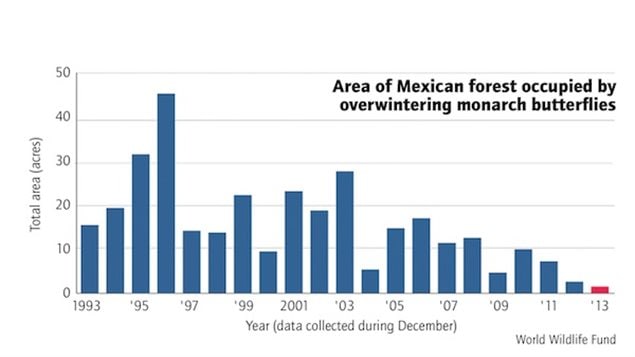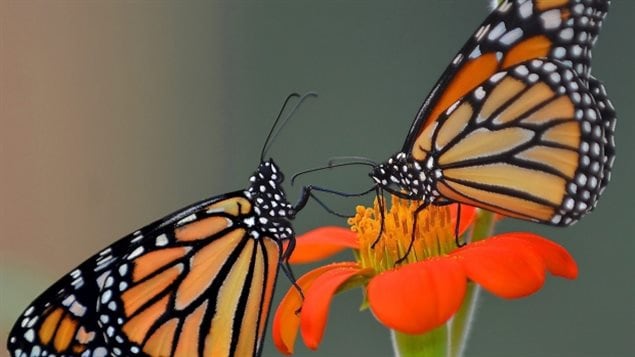A wet cool spring in the US south and midwest means fewer monarch butterflies this year in Canada, according to Chip Taylor of Monarch Watch at the University of Kansas.
He says rain in Texas and Oklahoma received a lot of rain, which kept the monarchs from moving northward.
Additionally, cooler temperatures in the eastern half of the continent also kept the iconic pollinators from moving north.
Overall he said, the numbers this year in central and eastern Canada will be down noticeably.
killer GM corn and soy
However, weather is only one of the monarchs concerns. For years habitat loss –deforestation- in the overwintering ground in Mexico was a serious concern. That threat has been greatly reduced in the past several years thanks to more stringent controls on illegal forestry there.
The big culprit now is seen as ethanol production in the US.
The $956 billion US Farm bill signed last year while reauthorizing “pollinator protection” of the 2008 bill, also encourages more corn and soy production.
This is where a big problem arrives, again with habitat loss, but this time with a once common plant, milkweed.
Monarch must have milkweed and only milkweed to lay eggs and for their caterpillars to eat.
Milkweed is common in untouched western grasslands, and used to grow alongside corn crops with no problem.
However when genetically modified corn and soy to resist herbicides came along, farmers began spraying the chemicals, such as Roundup, on their crops killing all plants not “Roundup ready”, including all milkweed.
The farm bill also continues incentives for more corn and soy to feed the demand for biofuels mandated by the US “Renewable Fuel Standard” of 2007.
The Nature Conservency says of the millions of acres of native grassland ploughed under for GM corn that it represents “a rate of loss, and faster, than the Amazon rainforest is disappearing.”

Chip Taylor points out that 20 million new acres of corn and soybeans were planted in the last seven years in the US, compared to 9.5 million in the previous decade. “This increase is largely due to the ethanol mandate,” he writes.
“What we’re seeing here in the United States,” he said, “is a very precipitous decline of monarchs that’s coincident with the adoption of Roundup-ready corn and soybeans.”
Everyone concerned with the decline of monarchs suggests planting milkweed on your property or balcony to help these beautiful pollinators.







For reasons beyond our control, and for an undetermined period of time, our comment section is now closed. However, our social networks remain open to your contributions.